Lecture
Historically, IT companies (or their projects) can be divided into grocery and outsourcing
These approaches have a number of similarities and differences, but the goal in both cases is the same: to earn the maximum amount of money.
Choosing a style you need to clearly recognize its strengths and weaknesses and compare them with your own physical data. Similarly, it is worth choosing a business model.
These models differ in many factors. Is there an absolute winner strategy? Should I choose one specific business model? Below we share the conclusions we reached in the process of finding a solution for the desktop.
Threshold of entry. Risks. Profit.
The whole essence of product development can be expressed in one phrase from an economics textbook: “The amount of expected profit is directly proportional to the degree of risk associated with it”.
Suppose you are going to create the best CRM system in the world and are sure that you know how. When can you test this hypothesis? Only after you try to sell your product. It is possible that from the start of the project, before receiving the first money, many months will pass and that the profit will be much less than expected, and maybe you will become a millionaire. In any case, first you invest. Of course there are many ways to reduce the risks, but to avoid them completely is impossible.
Another thing is outsourcing : you have assembled a team from a layout designer and designer and found a client who needs a landing page. Here it is - the first order for a young growing company. The only problem is that people like you are a complete UpWork, and it’s time to set $ - alas, not what you are aiming for
At the beginning of business development, recruiting is a problem for a grocery company . Experts want confidence in the future, but no one knows whether the product will shoot 100%. At the same time, an increase in salaries instantly affects the amount of investment, and the savings on employees jeopardizes the quality and timing of the release. Cherry on the cake is the fact that in addition to programmers in the team, you need to hire strong managers to set up work and promote the product, and such labor market in the CIS, to put it mildly, does not spoil. If a business managed to survive this difficult period and take its place under the sun, the situation with personnel changes dramatically, and the problems of a grocery company become less than those of an outsourcing company.
Now about outsourcing . If you are engaged in custom development - experts decide everything. It is their expertise that you ultimately sell to customers, which means your competitors will do everything to lure the best team members to themselves. Complicating the situation is that in the classical model of outsourcing it is rather difficult to develop a pool of competences of its employees. Very often, developers are growing "in breadth" and not "in depth", because you do not have a magic ball to predict which technology will "shoot" tomorrow. Here begins the purchase of players, as in football.
Of course, a high level of corporate culture makes it possible to make excellent specialists and motivate employees, even without having huge salaries and a wagon of buns, but not enough which outsourcing company can boast such cohesion. The best corporate culture is built by product developers. Is your programmer mom using your mobile app? Consider that you have already secured your complete loyalty. Outsourcing rarely boasts such arguments, so the cakes, cookies and, of course, money are used.
If your lifelong dream was to fall asleep poor and wake up rich, creating an outsourced business is a bad idea. The market for customized development is very flat, only strong arguments matter: clear marketing strategies, obvious advantages, experience and reputation. Time is your ally, the longer a company is on the market, the more attractive its portfolio is, the more chances to get serious orders and cool clients. In addition, whatever one may say, but any outsourcing sells, in the first place, the time of programmers. So, even if you are a unique company with unique specialists and excellent processes, your prices still have a clear upper limit, and there are not so many ways to reduce expenses (the topic of salaries has already risen higher).
Product development , by contrast, leaves room for surprises. Why not create a second Facebook, Viber or Uber? It is a pity that the chance: one in a million. So, it is quite possible that a sudden inheritance from distant relatives is the more likely way to become rich in one day.
Differentiate or die.
Jack Trout's words have become relevant for the IT market. The time when the ability to write code singled out by itself has long passed, so now all companies need to clearly formulate what exactly they can offer their customers. It does not matter here - whether you are creating products, or developing projects to order. Be kind enough to explain why what you are doing is cool and another company cannot. If there is no answer to the question, the future of business is foggy.
If you simplify the process of creating a software product as much as possible, then we recycle the time of programmers, designers, managers and other team members into an application / service / game (underline the appropriate). Here are just selling, we have not spent time. We sell an entity whose price is determined solely by the readiness of the market to buy it. That is, by how much the product solved the problem of the audience. In practice, the profit of outsourcing is formed in exactly the same way. The amount of profit depends on the ability to quickly and accurately solve the problems of another business. If the customer just wanted to buy a programmer’s time, he would hire him into his team, but the client doesn’t need it. Just like any user of the application or gamer, the customer of the outsourcer needs a certain program to work at the specified time as he expects. It is for this, and only for this, that he pays his money.
We are again returning to the topic of employees, as if you were at least a grocery company, even an outsourcing, you need to develop the team. IT specialists are fewer than vacancies, this is a fact, which means that someone is definitely not enough. This is especially true of senior positions. It is important that you have enough, right? So you need to invest in the education of employees, and even in the most notorious corporate culture, so that your smart programmers do not run away, in the end, where they pay more.
These are different and at the same time identical business models. As you can see, a large-scale battle strategies did not work. Swam and went. There is no better or worse approach, it’s just two options to make money in IT. The main thing is to remember that in recent years the market has grown strongly and does not forgive the devil-may-be approach to the development of the company, which means it is in your interest to honestly take into account all the advantages and disadvantages of the chosen model.
Among survey participants, 45% are employees of outsourcing companies, 15% are outstaffing companies, 34% are grocery and 6% are startups (outstaffing differs from outsourcing in that in the first case the employees themselves are transferred to the customer’s company, actually staying in the same place and performing the previous functions).
For the construction of diagrams, the proportions of “yes” or “often” answers were used, normalized to the number of employees of each type of company.
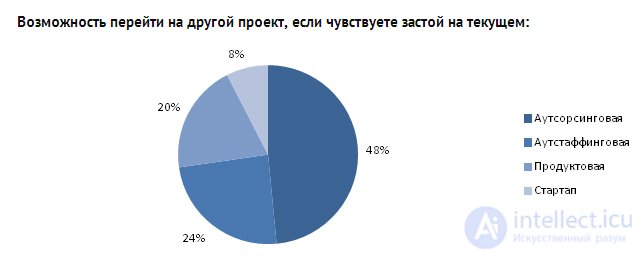
As a result of the survey, it turned out that work tasks are the most interesting - in startups. In total, 29% of respondents called their work tasks interesting, 11% called boring.
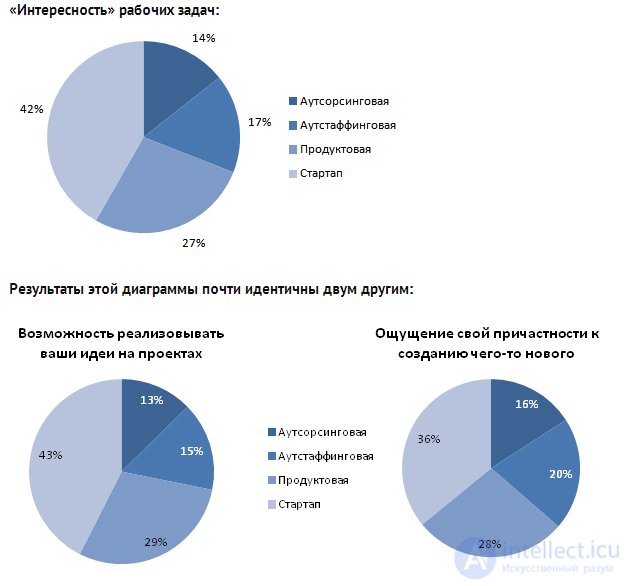
At the same time, the level of loyalty to the place of work is higher in startups, and the lowest - in outstaffing companies:
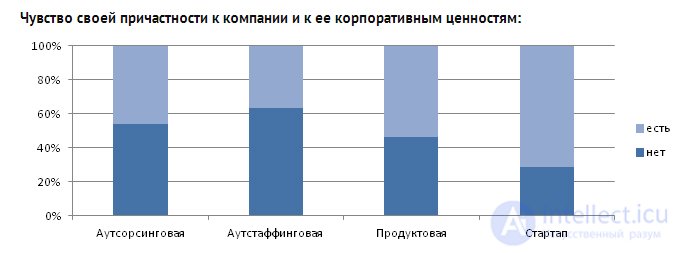
The authors of the study also analyzed where the level of “white” wages is higher: 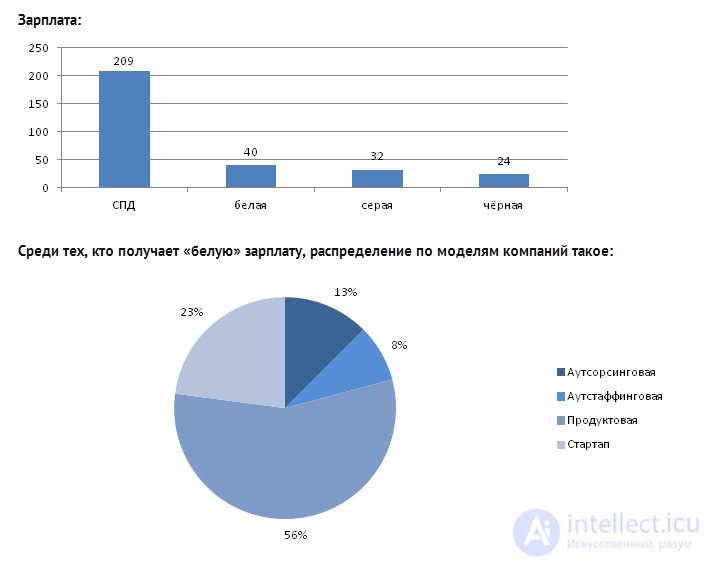
It also turned out that in start-ups, employees have to work more often than expected, and outsourcing companies often pay for their employees professional and language courses:

Interestingly, according to the survey results, a high level of English for work is most often required in an outstaffing company, and in grocery companies and startups there is also an initial level of knowledge of this language.
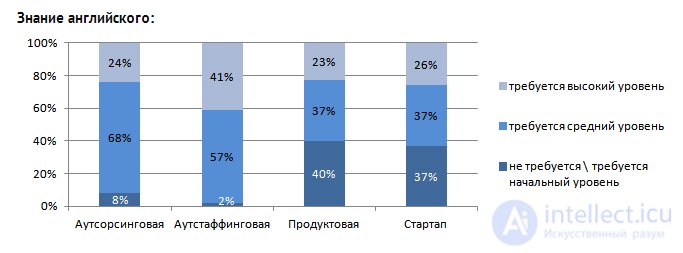
Comments
To leave a comment
software project management
Terms: software project management